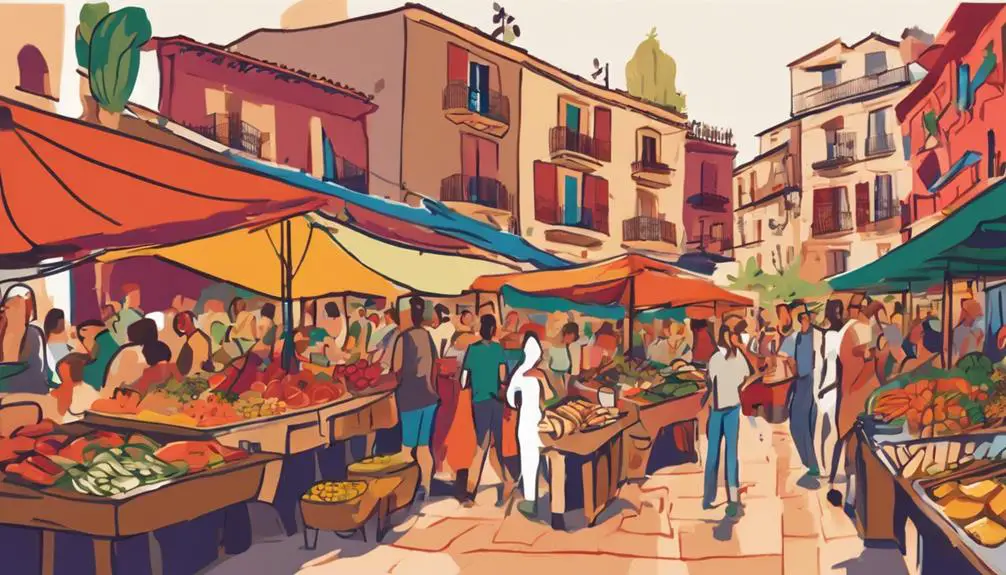When engaging in everyday conversations in Spain, you'll want to know the right slang to avoid misunderstandings and connect with locals. Familiarize yourself with phrases like 'tapas' and 'cerveza' for food and drink, 'hacerse el sueco' to feign ignorance, and 'me muero de risa' to express amusement. Insults and comebacks, like 'mírame' and '¿y tú qué?', will also come in handy. From regional slang to TV and movie references, mastering key Spanish slang will help you better understand the culture. As you explore further, you'll discover more phrases to enhance your experience.
Slang for Food and Drink

When you're hanging out with amigos in Spain, you'll likely find yourself ordering tapas and sipping cerveza, so mastering the slang for food and drink is essential to sound like a local.
Tapas culture is an integral part of Spanish life, and understanding the lingo will help you navigate the vibrant street eats scene. You'll want to know that 'tapeo' means going from bar to bar, trying different tapas, and 'ir de tapas' means going out to eat tapas with friends.
Don't be caught saying '¿Dónde está el baño?' (where is the bathroom?) when you mean '¿Dónde está la barra?' (where is the bar?). Familiarize yourself with terms like 'picoteo' (snacking) and 'merendar' (having a mid-afternoon snack).
When ordering, 'un café' means a coffee, while 'un café con leche' is a coffee with milk. With these phrases under your belt, you'll be well on your way to immersing yourself in Spain's lively Tapas Culture and Street Eats scene.
Everyday Expressions and Idioms
In Spain, you'll frequently hear everyday expressions and idioms that'll help you sound like a native, from 'hacerse el sueco' (to pretend not to understand) to 'estar la mar de…' (to be extremely). These phrases will help you navigate daily conversations with locals, making you feel more at home.
For instance, when expressing emotions, you can use phrases like 'me duele la cabeza' (I've got a headache) to convey frustration or 'me muero de risa' (I'm dying of laughter) to show amusement.
In your daily habits, you might hear 'me levanto con los pies' (I woke up on the wrong foot) to describe a bad morning or 'me voy a dar un paseo' (I'm going for a stroll) to announce a casual walk. Mastering these idioms will help you better connect with the Spanish culture and people.
As you incorporate these expressions into your daily conversations, you'll start to feel more like a local, and less like a tourist.
Insults and Comebacks

As you navigate the complexities of Spanish conversations, you'll inevitably encounter insults and comebacks, which can be both entertaining and intimidating. Be prepared to encounter phrases that might make you blush or spark a heated debate.
In some Latin American countries, verbal sparring is a common occurrence, especially in street fights or casual gatherings. You might hear someone say 'mírame' (look at me) or '¿quién es?' (who's that?), which can be a challenge or a provocation.
To respond effectively, you'll need to master some sassy responses. For instance, if someone calls you 'tonto' (fool), you could retort with '¿y tú qué?' (and what about you?). If someone says 'eres una nenaza' (you're a baby), you could shoot back with '¿y tú eres un experto?' (and are you an expert?).
Slang for Friends and Relationships
You'll likely find yourself using colloquial expressions to describe your friends and relationships in Spanish, which can add a touch of authenticity to your interactions. When it comes to friendships, you'll often hear amigos (friends) referring to each other as 'mi pana' (my buddy) or 'mi cuñado' (my brother-in-law, but used as a term of endearment).
You might even establish your own 'amigo codes' – unspoken rules or inside jokes that only your close friends understand.
In romantic relationships, you'll often hear 'pareja' (partner) or 'mi media naranja' (my half orange, meaning soulmate). Social media is filled with 'couple goals' (objetivo de pareja) – showcasing the perfect relationship. But be careful not to confuse 'novio' (boyfriend) with 'amigo' (friend), or you might get some raised eyebrows!
Mastering these expressions will help you build stronger relationships and connect with native speakers on a deeper level. By incorporating these colloquialisms into your daily conversations, you'll sound more natural and build stronger bonds with the people around you.
TV, Movies, and Pop Culture

Catch up on the latest Spanish TV shows and movies, and you'll find that native speakers frequently throw around colloquial expressions that'll leave you wondering what's going on. You might be binge-watching your favorite Netflix Favorites, like 'La Casa de Papel' or 'Élite,' and suddenly, characters start using slang that's not in your textbook. Don't worry, it's not just you! Even with subtitles, it can be tough to keep up.
Hollywood Stereotypes often portray Spanish speakers as passionate and fiery, but in reality, everyday conversations are peppered with colloquialisms that can be tricky to understand.
Take, for instance, the phrase 'tomar el pelo,' which roughly translates to 'to take someone's hair' but actually means to tease or joke with someone. It's essential to learn these expressions to better connect with native speakers and appreciate the nuances of Spanish pop culture.
Regional Slang to Know
From Madrid's 'churros' to Argentina's 'boludos,' each region in the Spanish-speaking world has its own unique slang that can leave even the most proficient language learners scratching their heads. As you navigate the diverse regional accents and dialects, you'll discover that slang is an integral part of the cultural fabric.
In Spain, for instance, you'll encounter the distinctive 'andaluz' accent in the south, while in the north, the 'vasco' dialect prevails. In Latin America, the Coastal dialects of Colombia and Venezuela are vastly different from the inland dialects of Bolivia and Peru.
You'll find that regional slang often reflects the local culture, history, and traditions. In Chile, for example, the 'chucao' slang is a blend of indigenous and Spanish influences. Similarly, in Mexico, the 'norteño' dialect is distinct from the 'yucateco' dialect of the Yucatán Peninsula.
To better connect with locals and avoid cultural faux pas, it's essential to familiarize yourself with the regional slang and accents. By doing so, you'll not only improve your language skills but also gain a deeper understanding of the rich cultural heritage that defines each region.
Frequently Asked Questions
Is Clave Spanish Slang Used in All Spanish-Speaking Countries?
As you explore the diverse world of Spanish-speaking countries, you'll find that regional dialects and cultural identity play a significant role in shaping language evolution. National pride and colonial legacy also influence the way Spanish is spoken.
Geographic variations are evident, with different countries adopting unique expressions. So, is a specific slang used universally? Unfortunately, the answer is no – each country has its distinct flavor, making Spanish a rich and dynamic language.
Can I Use Clave Slang in Formal Writing or Professional Settings?
When it comes to formal writing or professional settings, you'll want to maintain formal boundaries to guarantee your message is taken seriously.
While slang can be fun, it's generally not suitable for professional authenticity. Clave slang, in particular, is informal and regional, so it's best to avoid using it in formal writing or professional settings.
Instead, opt for standard Spanish that's widely understood and respected.
Are There Any Clave Slang Words That Are Offensive or Taboo?
When exploring slang in any culture, you must exercise cultural sensitivity. Some slang words or phrases can be offensive or taboo, even if they're widely used.
You should be cautious when using colloquial language, as it may be misinterpreted or offend certain groups. In particular, avoid using derogatory terms, racial slurs, or words with harmful connotations.
Can Non-Native Spanish Speakers Use Clave Slang Effectively?
As you venture into the world of linguistic exploration, you ponder whether non-native speakers can wield slang effectively. Essentially, the answer lies in embracing cultural immersion. Accents matter, and adopting the nuances of native speakers is vital.
Is Clave Slang Only Used by Young People in Spain and Latin America?
You might assume that certain slang is exclusive to young people, but that's not always the case. In reality, slang can transcend age restrictions and is often a reflection of cultural identity.
When you look at the way people communicate, you'll find that slang is used across generations, with each group adding their own flair.
It's not about age; it's about being part of a cultural movement that speaks to your identity.
Conclusion
Mastering key Spanish slang can elevate your language skills and immerse you in the culture.
Take the phrase 'tomar el pelo' (to take someone's hair), meaning to tease or make fun of someone.
Imagine being at a tapas bar in Madrid, and your friend makes a joke about your soccer team's latest loss. You can respond with 'me estás tomando el pelo' (you're teasing me), and everyone will understand the lighthearted jab.
With these slang phrases, you'll navigate everyday conversations like a native.







